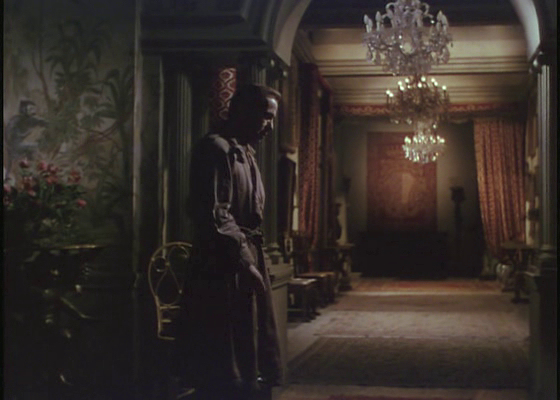The No Shoes

Just because a movie is more impressed with itself than it deserves to be doesn't mean it's an entirely bad film. Joseph L. Mankiewicz's 1954 film The Barefoot Contessa demonstrates why writers are often advised to "show, not tell." That Jack Cardiff, one of the greatest cinematographers in history, shot the film makes its chosen storytelling method particularly tragic. But some of the dialogue is clever, particularly coming out of Humphrey Bogart's mouth and just taking in the splendour of Cardiff's work is a joy in itself.

The biggest problem with the film is its star, Ava Gardner as a movie star, Maria Vargas. I was reminded of Anne Baxter in All About Eve, another Joe Mankiewicz film, in that so much of the movie is hinged on the actress clearly possessing an extraordinary magnetism when she does not. All About Eve is saved by the fact that Bette Davis does have that--though the film doesn't work as it's intended because we never buy Baxter as any kind of real successor to Davis. I've heard Ava Gardner is one of the most beautiful women to ever work in Hollywood but, and maybe it's just me, while I think she's pretty, she'd be pretty far down my list. I sooner think of Ingrid Bergman, Marilyn Monroe, Audrey Hepburn, Joan Crawford, Hedy Lamarr, Greta Garbo, Barbara Stanwyck . . . and many others. And those women, a lot of their appeal, an integral part of their beauty, is that they were capable of interesting performances. Gardner has always struck me as flat and lifeless.
The movie begins with a group of Hollywood bigwigs, headed by a cold and cynical Wall Street guy named Kirk Edwards (Warren Stevens), showing up in a little nightclub in Spain to see the legendary performer Maria Vargas in the hopes of hiring her as a star to launch his career as a movie mogul. Also on hand is Humphrey Bogart as writer/director Harry Dawes, perhaps an avatar of Mankiewicz, which would explain why he's a dull paragon of virtue. His narration accompanies part of the film, blandly explaining everything, telling us he's a writer and director, and so on. He gives Maria a lot of fatherly advice--he's not the love interest because he's married. So obviously there can't be chemistry. He advises Maria to stop having her affairs with men he doesn't approve of but we never meet any of these men or learn why he disapproves of him. Because he disapproves of villains in the film like Kirk Edwards, and he's Humphrey Bogart, we take his word, but this still leaves a massive void in Maria's character development, not made up for by Gardner.

Another thing All About Eve had going for it was George Sanders' devilish movie critic who made being a soulless bastard terribly attractive. His counterpart in The Barefoot Contessa is Marius Goring as a South American dictator who steals Maria away from Kirk Edwards. It's a deeply flawed scene in which he does so, one that might have been easily fixed if someone like Sanders' character had been in the writing room to bonk Mankiewicz in the head.

It's at a party Kirk is throwing at Maria's house in Hollywood. Harry and Maria come inside when they hear there's a fight starting between Goring's character, Alberto Bravano, and Kirk. The whole fight consists of Alberto smiling, calling himself at length a coward, a weakling, an exploiter of people, and finishing, "But I'm willing to admit it!" to which Kirk only replies with things like "Shut up!" or pointing out that Alberto is a dictator. The scene, which ends with an awkward moment of Hollywood sentimentality as a washed up movie actress soberly explains she knows what she's doing when she goes home with Kirk, is meant to show us why Kirk is losing his status despite all his money and success. But it ends up only telling us that Alberto is a bad guy which makes the later reveal that he's actually a bad guy seem really flat footed. None of this is helped by the fact that Goring puts on a ridiculous accent that seems to come from somewhere between Argentina and Transylvania.

This was the second time Ava Gardner, Marius Goring, and Jack Cardiff all worked on the same film, the first being the superior 1951 film Pandora and the Flying Dutchman. But in hiring Cardiff and Goring, I suspect Mankiewicz was thinking more of The Red Shoes, a film whose influence can be seen in Maria's relationship with men who try to control her or love her and in her preoccupation with shoes as a sign of something that confines her. The climax of the film all but screams, "Joe Mankiewicz likes The Red Shoes!"
But like I said, Cardiff's cinematography makes this film a joy to behold. I melted when I saw this early morning shot in the count's courtyard:

I love Cardiff's characteristic colourful chiaroscuro.
